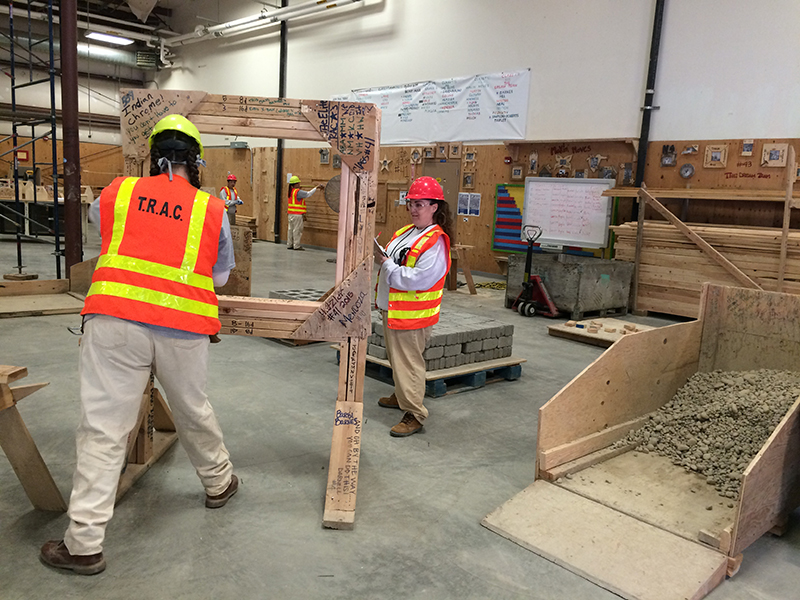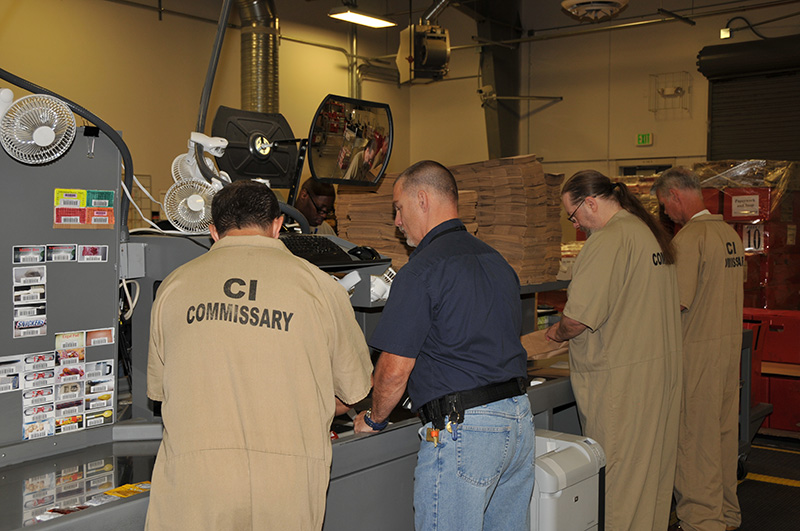The legislature has vested the Department of Corrections with the power to establish a voluntary comprehensive work program that does not unfairly compete with Washington businesses (RCW 72.09.100), and the Department has done so through the Correctional Industries program.
Overview
Correctional Industries (CI) is a unique blend of business and government, using private industry tools and techniques to provide a public service. The division's goal is to transform lives and increase successful reentry through training and mentoring by maintaining and expanding work training programs for incarcerated individuals which develop marketable job skills, instill and promote positive work ethics, and reduce the tax burden of corrections.
CI operates businesses within all prison facilities throughout Washington and employs approximately 2,200 incarcerated individuals. Training and workforce development opportunities are provided to incarcerated individuals through work programs modeled after the real-world, focusing on developing both technical and social skills. By linking basic skills, vocational skills, and on-the-job training, incarcerated individuals are prepared for employment when they reenter into the community.
What the Research Says
Stable employment is critical to successful transition into the community. A Washington State University study determined that incarcerated individuals who participate in CI work programs were significantly less likely to commit new offenses leading to conviction and significantly more likely to remain in the community longer without committing a new offense. Additionally, once back in the community, formally incarcerated individuals who participated in CI programs were more likely to have a legal source of income, earn more than $1,000 per month, and earn an average of $1.03 more per hour than those who did not participate.
Additionally, work training and development also play an important role in daily institution management. Those who participate in CI work programs are significantly less likely to commit a violent infraction during incarceration.
Impact of CI Work Programs
All Correctional Industries (CI) employees have a direct impact on incarcerated workers by imparting technical and social skills throughout the work day. Technical skills help a person secure a job, while social skills help a person keep a job and advance professionally and financially. CI employees also serve as workplace role models and help incarcerated individuals build their self-confidence, and positive work behavior and habits for their release.
Workforce Development Specialists
Workforce Development (WD) specialists work with incarcerated individuals on soft skill development and training and reentry planning while still incarcerated. They also work individually with participants to develop an employment plan for release.
In addition to classroom training and individual plan preparation, WD specialists coordinate with community partners to host career training events such as mock interview fairs. Incarcerated individuals dress in shirts and ties to participate in mock interviews with members from the local community. The event provides incarcerated individuals with real world experience and feedback so they are better prepared to interact with potential outside employers upon release.
Community Employment Services
Community Employment Services (CES) connects incarcerated individuals with post-release employment. Through community partnerships, incarcerated individuals who participate in CI's work programs have the opportunity to successfully reintegrate into society and engage in training, education, or employment.
Skill Development
Soft Skills
Correctional Industries (CI) employees are not only on-the-job role models, but many are also trained soft skills instructors. Participants are expected to complete Makin' It Work, a 20-hour, employer based cognitive training course. The course helps incarcerated individuals understand the behaviors and expectations of employers so they can develop the necessary cognitive and behavioral thinking to help them during their work training with CI and when they release back into the community.
Technical Skills
Incarcerated individuals have the opportunity to learn many technical skills. CI operates a variety of service and manufacturing industries in the Department's prison facilities. Incarcerated individuals learn technical skills ranging from entry level to high level computer numeric control (CNC) machine operation. Others include:
- Accounting
- Assembly
- Baking
- Carpentry
- Drafting
- Data Entry
- Fabrication
- Food Packaging
- Food Service
- Janitorial
- Laundry
- Paint and Powder Coating
- Production Work
- Upholstery
- Sewing Machine Operation
- Welding
Certificates of Proficiency
Incarcerated individuals may earn Certificates of Proficiency once they complete Makin' It Work, achieve 1,500 hours of on-the-job training, and demonstrate a high level of job skill based upon criteria established by the U.S. Bureau of Labor Statistics Standard Occupational Classifications. Once released, incarcerated individuals can use their certificate(s) to search for similar jobs and show potential employers their skill set.
Trades Related Apprenticeship Coaching (TRAC)
The Trades Related Apprenticeship Coaching (TRAC) program offers incarcerated individuals at Washington Corrections Center for Women (WCCW) with education and job training for non-traditional female jobs. In partnership with the local carpenters, laborers, and ironworkers union, incarcerated individuals have the opportunity to complete a pre-apprenticeship program and upon release are eligible for direct entry into the local union apprenticeships. You can learn more about the TRAC program at CI's website TRAC brochure.
Correctional Industries Advisory Committee
RCW 72.09.70 establishes a correctional industries advisory committee that shall make recommendations to the secretary regarding the implementation of the work program (RCW 72.09.100). The committee shall consist of nine voting members appointed by the secretary who shall serve a three-year staggered term. The speaker of the house of representatives and the president of the senate shall also each appoint one member from each of the two largest caucuses in their respective houses who shall serve two-year terms (RCW 72.09.80).
If you are interested in joining the advisory committee, please contact us.
Current Committee Members
Senate President Appointed Representatives
- Claire Wilson, Senator
Non-Voting Advisory Committee Member - Matt Boehnke, Senator
Non-Voting Advisory Committee Member
Public Representatives
- Dr. Faith Lutze
- Darrell Johnson
- Loren Taylor
House Speaker Appointed Representatives
- Brian Burnett, Representative Non-Voting Advisory Committee Member
- Mary Fosse, Representative Non-Voting Advisory Committee Member
Business Representatives
- Demetria Lynn Strickland
- Chris Elwell, Sound Transit
- David Aiken
Labor Representatives
- Marianna Talbott, Northwest Carpenters Institute
- Karen Dove, Apprenticeship & Non-traditional Employment for Women (ANEW)
- Minna Long, Ironworkers Union
Department of Corrections
- Tim Lang, Secretary
- Scott Russell, Deputy Secretary
- Danielle Armbruster, Reentry Assistant Secretary
Correctional Industries
- Jamie Dolan, Director
- Todd Cunnington, Deputy Director
- Ryan Sadler, Assistant Director
- Lindsey Konrad, Assistant Director
- Vicki Hoffman, Assistant Director
- Mimi Jansen, Brand and Mission Administrator
- Sarah Goff, Headquarters Operations Manager
Meeting Details
Meeting Location
Meeting will be held in person at CI Headquarters and Virtually on Microsoft Teams.
CI Headquarters
801 88th Avenue SE
Tumwater, WA 98501
2026 Meeting Dates & Times
Virtual Meeting on Microsoft Teams or call in (audio only): (253) 372-2181
| Date | Time | Meeting Link | Meeting ID | Passcode |
|---|---|---|---|---|
| March 12, 2026 | 9:00 a.m. to 11:00 a.m. | Meeting link | 235 068 394 775 | uq2Dr9wq |
| June 4, 2026 | 9:00 a.m. to 11:00 a.m. | Meeting link | 287 652 930 883 | Bs2P58CX |
| September 24, 2026 | 9:00 a.m. to 11:00 a.m. | Meeting link | 249 020 674 377 | cq9tg6CA |
| December 10, 2026 | 9:00 a.m. to 11:00 a.m. | Meeting link | 232 145 055 567 | o6nk6Dh9 |
Meeting Materials
Meeting materials are available on this website for two years plus the current year. Contact CI Support for archived meeting documentation.
December 4, 2025 Meeting Materials
- 12/4/2025 Agenda
- 12/4/2025 Division Update
- 12/4/2025 Correctional Industries Annual Report
- 12/4/2024 Market Share Report
- 12/4/2025 Meeting Recording
September 18, 2025 Meeting Materials
- 9/18/2025 Meeting Agenda
- 9/18/2025 Meeting Minutes
- 9/18/2025 Division Update
- 9/18/2025 Meeting Recording
- 6/2025 Washington State Institute for Public Policy: Assessments and Charges in Washington Department of Corrections Facilities, A Review and Analysis
- 6/2025 Washington State Institute for Public Policy: Contracting and Labor Practices in Washington State's Correctional Industries
June 5, 2025 Meeting Materials
- 6/5/2025 Meeting Agenda
- 6/5/2025 Meeting Minutes
- 6/5/2025 Division Update
- 6/5/2025 Meeting Recording
March 13, 2025 Meeting Materials
- 3/13/2025 Meeting Agenda
- 3/13/2025 Meeting Minutes
- 3/13/2025 Division Update
- 3/13/2025 Meeting Recording
December 24, 2024 Meeting Materials
- 12/24/2024 Meeting Minutes
- 11/2024 Annual Report 2024
- 11/2024 Fiscal Year 2024 Fact Sheet
- 11/2024 CI Market Share Report
- 2025 Advisory Board Meeting Notification Memo
- 12/24/2024 Meeting Recording
September 19, 2024 Meeting Materials
- 9/19/2024 Meeting Agenda
- 9/19/2024 Meeting Minutes
- 9/19/2024 Division Update
- 9/19/2024 Meeting Recording
June 6, 2024 Meeting Materials
- 6/6/2024 Meeting Minutes
- 6/6/2024 Meeting Guidelines
- 6/6/2024 Division Update
- 6/6/2024 Meeting Recording
March 21, 2024 Meeting Materials
- 3/21/2024 Meeting Agenda
- 3/21/2024 Meeting Minutes
- 3/21/2024 Presentation
- 3/21/2024 Division Update
- 3/21/2024 Meeting Recording
December 7, 2023 Meeting Materials
- 12/7/2023 Meeting Agenda
- 12/7/2023 Meeting Minutes
- 11/2023 Fiscal Year 2023 Fact Sheet
- 12/7/2023 Fiscal Year 2023 Annual Report
- 12/7/2023 Division Update
- 12/7/2023 Reentry Briefing FY 2023
- 12/7/2023 Meeting Recording
September 7, 2023 Meeting Materials
- 9/7/2023 Meeting Agenda
- 9/7/2023 Meeting Minutes
- 9/7/2023 Presentation
- 11/2022 Fiscal Year 2022 Fact Sheet
- 9/7/2023 Division Update
- 9/7/2023 Meeting Recording
June 1, 2023 Meeting Materials
- 6/1/2023 Meeting Agenda
- 6/1/2023 Meeting Minutes
- 6/1/2023 Presentation
- 6/1/2023 Year to Year Revenue Chart
- 6/1/2023 Division Update
- 6/1/2023 Braille Certification
March 2, 2023 Meeting Materials
- 3/2/2023 Meeting Agenda
- 11/2022 Fiscal Year 2022 Fact Sheet
- 2/2023 Core Values
- 1/2019 Workforce Development
- 3/2/2022 Division Update
- 3/2/2022 Presentation
- 3/2023 Financial Operations Report
- 3/2/2023 Meeting Minutes
December 8, 2022 Meeting Materials
- 12/8/2022 Meeting Agenda
- 12/8/2022 Meeting Minutes
- 12/8/2022 Fiscal Year 2022 Annual Report
- 12/8/2022 Fiscal Year 2022 Market Share Report
- 11/2022 Fiscal Year 2022 Fact Sheet
- 12/8/2022 Division Update
- 12/8/2022 Financial Operations Report
September 1, 2022 Meeting Materials
- 9/1/2022 Meeting Agenda
- 9/1/2022 Meeting Minutes
- 9/1/2022 Meeting Recording
- 9/1/2022 Presentation
- 9/1/2022 Division Update
- 9/1/2022 Financial Operations Report
- 9/1/2022 McNeil Island Stewardship (MIS) Financial Operations Report
June 2, 2022 Meeting Materials
- 6/2/2022 Meeting Agenda
- 6/2/2022 Meeting Minutes
- 6/2/2022 Meeting Recording
- 6/2/2022 Presentation
- 6/2/2022 Division Update
- 6/2/2022 Ethnicity Breakdown Report
March 3, 2022 Meeting Materials
- 3/3/2022 Meeting Agenda
- 3/3/2022 Meeting Minutes
- 3/3/2022 Meeting Recording
- 3/3/2022 Presentation
- 3/3/2022 Division Update
- 3/3/2022 Financial Operations Report






